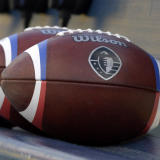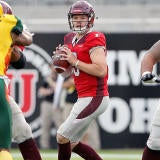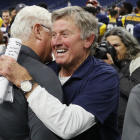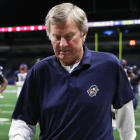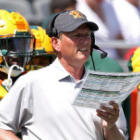Observing Steve Spurrier in his natural element deserved the David Attenborough treatment.
On the football fields of San Antonio in central Texas, a Spurrier has emerged from the winter months. He stands with his arms crossed, observing the swarming chaos around him. At 73 years old, a Spurrier can continue coaching for years beyond similar species. Research scientists have concluded Spurrier's wit and intelligence are amongst the highest of his kind found anywhere in the world.
/Cut to rolling space shot of North America.
Indeed, the "Head Ball Coach" looked completely at ease overlooking practice at the home stadium for the University of Incarnate Word in San Antonio. It was training camp time for the Alliance of American Football and the Orlando Apollos are largely considered to be one of the top contenders in the new eight-team league. The sun was out, the temperature was mild and pads were clacking. It all felt so right.
Then, the feeling was officially corroborated. After the final horn blew, Spurrier walked up to the Apollos' in-house video crew for a quick interview. With his sunglasses and ball cap on, he made a sucking sound with his teeth and uttered a signature "Waylp."
Yep, Steve Spurrier was back where he belonged.
"I think it's pretty normal," he opined about the day's practice. "It's what I'm used to."
Spurrier is here to begin with because he succumbed to what he calls the "two-year itch." It's a condition that affects retired coaches and players alike. Spurrier got that itch about a year-and-a-half ago. He's been serving as an ambassador at Florida, his alma mater, where he won the Heisman Trophy as a quarterback in 1966. And, yet, he found himself still engaged with the evolution of football, particularly on offense.
"The game has changed in three years," he said, "just with the ball, guys in motion, the zone reads, throwing it all over the place, the RPOs. If there was real good ball play, shoot, I'd go jot it down somewhere and then put it on another sheet when I got home. I'm always looking for a new ball play, a good new ball play.
"When I was sitting up in the press box watching a bunch of teams play, [I thought] if I could coach offense for some of these guys, maybe I should be doing it," he added. "And then this opportunity come up. But without this opportunity, I doubt if I would have been a coach."
Spurrier got an initial call from Arizona Hotshots coach Rick Neuheisel last March, followed by another call -- this time, an offer -- from his former Tampa Bay Buccaneers teammate J.K. McKay, the AAF's Head of Football Operations. The new league wanted Spurrier to coach Orlando, which he happily accepted. Orlando, only a two-hour drive from Gainesville, fits Spurrier and his family well. His wife, Jerri, enjoys being back amongst the players. For Spurrier, the chance to call plays again -- in addition to his head-coaching duties, Spurrier is the offensive coordinator and quarterbacks coach -- and develop players for only five months out of the year was just long enough to stay busy without dedicating too much time to it.
You see, this is retirement for Spurrier. He remains active with Florida, coaches a little ball in the spring and plays a round of golf with a cooler of Coors in his downtime.
To understand why this combination works for him, you need to understand first why he got out of the game to begin with. Spurrier left, abruptly, more than three years ago in the middle of a sagging season at South Carolina. The Gamecocks were 2-4 and a resounding 0-for in the SEC. In up and leaving, Spurrier was literally the "Well ... bye" meme.
Spurrier had built South Carolina, his third collegiate coaching stop after Duke and Florida, where he had also won, into a legitimate SEC East contender, winning a divisional title in 2010 followed by three consecutive 11-win seasons. However, the program was in a bad place by 2015, so Spurrier quit. There's a legitimate criticism in how Spurrier left; call it abandonment if you will. Then again, Spurrier has never cared about your criticism, and if nothing else, he was at least transparent after the fact and donated his $3 million buyout.
Spurrier's exit was extremely on-brand, too. The HBC has never believed, and will never believe, that football is anything more than what it is: a game. He did not abide by the commonly-held coaching practice that working tirelessly longer hours somehow meant working harder or smarter. While he was an excellent recruiter, pulling in in-state blue-chip talent like running back Marcus Lattimore and defensive end Jadeveon Clowney, it was obvious that toward the end that recruiting was lacking. The truth is Spurrier had been contemplating retirement since 2014. He admitted to making a mistake by coming back for another season, so he left without wasting another minute of others contemplating his future on his behalf.
Spurrier doesn't have to recruit anymore. He also doesn't have to deal with the politics or structure of coaching in the NFL, which he did, unsuccessfully, for two seasons with Washington in 2002 and '03. In the AAF, Spurrier has found a sweet spot of player development and play-calling with none of the side effects.
Perhaps no player has noticed Spurrier's second wind more than Apollos quarterback Garrett Gilbert. The former Gatorade High School Football Player of the Year in 2008 has had a journeyman's career, from Texas and SMU in college, to five teams in five years in the NFL. As such, he's been around every type of quarterbacks coach you can imagine, from Arkansas' Chad Morris (then the coach at Austin's Lake Travis High School), to June Jones and Josh McDaniels.
With Spurrier leading the way and Gilbert at QB, the Apollos have the second-best odds to win the AAF behind only the Arizona Hotshots (and they're also second in our Power Rankings).
In Spurrier, Gilbert finds a sharp tactician who hasn't missed a step."He's been real big on our eyes, for all of us, just making sure you're not staring guys down, working your eyes through your progression, holding guys to make certain throws. So that's one thing," Gilbert said. "And for me, personally, just always working on your feet. Your feet drive everything. So that's physically what we're working on.
"As far as our system's concerned, the mental part of it, we've got most of our stuff in. Now it's just a matter of mastering it. Everything's expedited with this whole league as far as, we had three days of mini camp, now we're in training camp. And you're looking at a game in less than three weeks now."
Oh, and yes, Spurrier still has those one-liners.
"He's got a good dry little sense of humor and keeps us on our toes," Gilbert said. "The receivers especially enjoy that whenever he kind of gets onto one of them."
Spurrier is having fun because he knows this is it. He has three or four years left of coaching, maybe five if he's lucky. "Health always plays a key to all of it," he said. There will be a day when Spurrier is done. He'll probably be the one to decide when that day is. And when he's done, he's done. Until then, like so many other players and coaches around the alliance, he's trying to squeeze out all of the football he has left in him.
On a practice field, surrounded by those who, like him, are looking for another chance, one thing was clear: Spurrier belonged.


